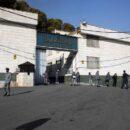ExIm Bank Reauthorization Critical for US-Africa Business – By Alyson McGee

 The US Export-Import (ExIm) Bank has become the latest political football in Washington, as Democrats and Republicans argue over its value to the American economy. ExIm Bank is the US government’s export credit agency, which provides American companies with trade financing, insurance, and loan guarantees. In doing so, it assumes some of the risk inherent in international business and facilitates a greater volume of US trade flows. ExIm’s charter is set to expire on September 30, requiring a reauthorization by Congress in order to keep the 80 year-old agency alive. Though it is tied to a domestic government spending bill, ExIm Bank’s reauthorization is very much an international matter. Its fate is intrinsically linked to the future of U.S. business in Africa, as many US companies require government-backed support in order to do business on the continent.
The US Export-Import (ExIm) Bank has become the latest political football in Washington, as Democrats and Republicans argue over its value to the American economy. ExIm Bank is the US government’s export credit agency, which provides American companies with trade financing, insurance, and loan guarantees. In doing so, it assumes some of the risk inherent in international business and facilitates a greater volume of US trade flows. ExIm’s charter is set to expire on September 30, requiring a reauthorization by Congress in order to keep the 80 year-old agency alive. Though it is tied to a domestic government spending bill, ExIm Bank’s reauthorization is very much an international matter. Its fate is intrinsically linked to the future of U.S. business in Africa, as many US companies require government-backed support in order to do business on the continent.
Despite Africa’s impressive growth story over the past decade, US companies have been slower than competitors from Europe and Asia to break into African markets. However, many American companies are now waking up to the reality that Africa ought to feature prominently in their growth strategies, particularly as economies remain weak in Western Europe and Japan and as consumer demand starts to slow in China and the other BRICs. The rapidly expanding middle class in Africa, now estimated at 300 million, is eager to buy American goods, but US-Africa trade is still negligible relative to Africa’s other trade partners. In fact, the U.S. represents the only major partner that trades less with Africa today than it did before the global financial crisis.
For many companies, such as General Electric (GE), that are veterans of doing business on the continent, ExIm Bank has been fundamental to their success. The Bank has authorized over $5 billion in financing for US-Africa trade deals in the last five years, allowing African importers to buy US goods on credit and giving US companies the security of insurance for large deals. Getting the same services from US banks and insurance companies would come at a higher premium, while most African countries lack the domestic financial institutions that could provide comparable services. Moreover, ExIm Bank provides services to US companies of all sizes, helping smaller businesses build a customer base in Africa.
Africa has become a competitive place for global companies, many of which rely on support from their home governments for business deals. China’s ExIm Bank, for example, has helped Chinese companies become the dominant force behind developing the continent’s infrastructure. In November 2013, the Chinese government announced $1 trillion worth of investment in Africa by 2025. Much of this will be facilitated by China’s ExIm Bank. In order to remain competitive, US companies will also need government support when chasing business deals in Africa.
The key criticism of ExIm Bank is that it subsidizes large US corporations that are doing business abroad, which thereby gives the government too large of a role in the free market. This is a short-sighted critique. ExIm Bank does not cost the American taxpayer a dime””it has actually returned $2 billion to the economy and has created 1.2 million U.S. jobs over its lifetime. The capital flows that are facilitated by ExIm also help create jobs in Africa, which is an effective and sustainable way for the US to help reduce poverty on the continent. Congress needs to take a longer-term view of the benefits that ExIm Bank affords US companies, which must continue to develop new export markets in order to survive.
Alyson McGee is Senior Associate at The Whitaker Group.





